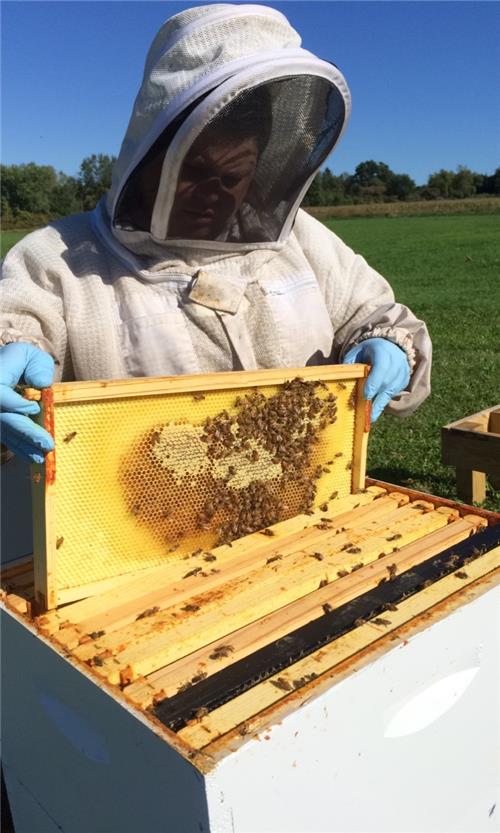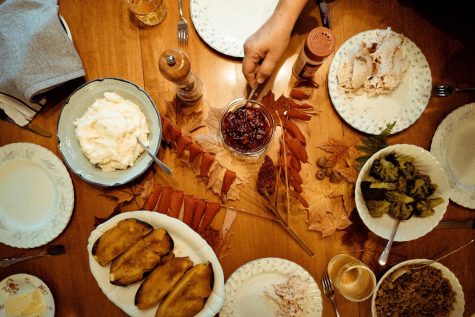UMass apiary aims to save bees from extinction
AMHERST — Bees are an integral part of human life, from pollinating the produce we buy at the grocery store to the flowers that sit on our tables.
But the bees are dying at an alarming rate.
According to the University of Massachusetts Amherst Beekeeping Club Treasurer Mackay Eyster, much of our favorite supermarket produce gets to us because honeybees are such great pollinators.
“One-third of our food comes from pollinated crops, like most vegetables and fruits we eat,” Eyster said.
Honeybee populations have decreased about 30 percent in the past year throughout the United States, and have steadily gone down since the first major drop in 2006.
Why the sudden change?
Researchers at UMass, as well as the Commonwealth of Massachusetts and Greenpeace Conservation Company, link this mass decline to pesticides.
“Tons of crops use pesticides, then end up realizing how much they need bees to help their crops, so it’s a vicious circle,” Eyster said. “These chemicals are really harmful to the bees, and it is eliminating mass numbers of them.”
Neonicotinoid, a chemical derived from nicotine, is found in several outdoor garden chemicals and fertilizers. This insecticide permeates the soil and can remain there for months, causing bees to become addicted.
The Xerces Society, an insect conservation organization, shared that highly concentrated residue of neonicotinoid have been found in pollen, showing that it is toxic to honeybees. The nicotine stimulates the same sensory systems in the bee’s brain as it does in the human brain.
“Because it has nicotine bonds in it, the pollinators are drawn to it and grow attached,” said Eyster. “It’s killing them. It’s been banned in Europe, but not in the U.S. yet. We’re trying to see if we can change that.”
The UMass Beekeeping Club has made efforts to influence the state to ban neonicotinoid through petitioning and hosting public seminars.
“They are a group of random, concerned students that recently came together and tried to show the state why this is important. They’ve reached out to faculty who are also reaching out to the government,” Eyster said.
Precautions against the Zika virus have also been deadly to bees. In South Carolina, among other states, the government has sprayed the environment to kill insects and mosquitos that carry the Zika virus. An insecticide called Naled is used, and it also kills bees. As a result, many honeybee colonies are disappearing.
The first Massachusetts state apiary was opened this summer by the UMass Stockbridge School of Agriculture in collaboration with Massachusetts Department of Agricultural Resources.
Located within the UMass Agricultural Learning Center, the apiary contains 12 hives and is surrounded by a solar-powered electric fence. It is adjacent to the UMass Pollinators Conservation Project, a plan organized to work towards sustaining and protecting bees.
“The hives are set up to mimic what bees are exposed to in the wild, and it’s really close to home,” said Chief Apiary Inspector Kim Skyrm.
Skyrm explained that removable frames allow beekeepers to extract honey from the hives without causing damage.
“They’re able to live and extract their pollen the best they can,” Skyrm said.
Honeybees also need a specific climate to thrive in, according to Skyrm. The apiary service provides this.
“Bees need to squeeze their little bodies through a small space, which is five-eighths of an inch,” Skyrm said. “If it is any more than that it disrupts the climate of the hive, so we clog it so there isn’t a draft. This helps their development immensely.”
“What we want to do is provide a space where the bees can be protected and thrive, as well as for students to have the chance to learn and do their research,” said Skyrm.
The apiary is intended to support and sustain the culture of bees, as well as provide effective communication between honey beekeepers, pesticide applicators, farmers, regulators and government officials.
Educational outreach has provided a benefit for Stockbridge, by assisting student farmers in their research and efforts to preserve pollen and natural products like honey.
“UMass started out as an agricultural school. We want to bring that back in the best way we can,” Eyster said.
Email Kylee at kdenesha.umass.edu, or follow her on Twitter @KyleeDenesha.











